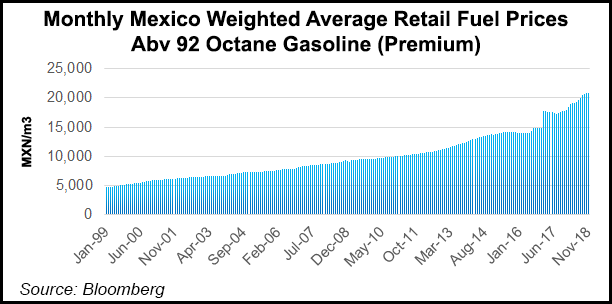Regulatory | NGI All News Access | NGI The Weekly Gas Market Report
Mexico Fuel Crisis Illustrates Case For Energy Reform, Experts Say
The fuel supply crisis currently gripping Mexico underscores the importance of the country’s 2013 constitutional energy reform, according to local experts.

In an effort to combat fuel theft from the refineries, pipelines and storage terminals of national oil company Petróleos Mexicanos (Pemex) by organized criminals, Mexico’s president Andrés Manuel López Obrador this week authorized some 4,000 troops to take control of vulnerable points throughout Pemex’s downstream operations.
While the crackdown has caused the number of illegal taps to slow, this has mainly been achieved by closing Pemex pipelines in lieu of the slower and costlier transport methods of truck and rail.
The crisis has exposed Mexico’s overdependence on a single operator (Pemex) to supply its refined product needs, according to Welligence Energy Analytics Vice President Pablo Medina, who tweeted on Tuesday, “Without private firms importing gasoline (ExxonMobil), what do you think would have happened? AMLO [López Obrador] just demonstrated why the energy reform was so necessary.”
The reform allowed private sector firms to compete directly against Pemex in all segments of the oil and gas value chain for the first time in the country’s modern history.
“This is the biggest lesson to learn from this,” GMEC energy consultancy’s Gonzalo Monroy told NGI’s Mexico GPI. “Pemex can’t go it alone.”
Authorities also failed to properly take into account the inventory levels in Pemex’s storage and distribution terminals, Monroy said, which coupled with high demand led to “a perfect storm.”
“It’s well known that the lack of storage for refined products is a reality,” Medina said. “Why do…so many companies want to invest in logistics? Because there’s an opportunity.”
As highlighted in a July note by RBN Energy analyst Housley Carr, until April 2016, Pemex was the only firm allowed to import gasoline and diesel into Mexico.
“Mexican demand for U.S.-sourced refined products continues to increase, but Mexico lacks the infrastructure required to efficiently import, store and distribute large volumes of gasoline and diesel,” Carr wrote.
Similar dynamics have driven a historic buildout of Mexico’s natural gas pipeline network, as well as a call from natural gas pipeline system operator Cenagas for underground natural gas storage capacity.
Although López Obrador acknowledged the supply delays are being caused by the anti-theft initiative, he has continued to deny the existence of a shortage, despite widespread reports of the contrary.
“I repeat, there is enough gasoline in the country,” López Obrador said during his Wednesday morning press conference.
Local magazine Proceso reported on Tuesday evening that some 49 filling stations in Mexico City alone were either closed or limiting their fuel sales, as pictures and testimonials of long lines at stations in the capital and elsewhere circulated on social media.
© 2024 Natural Gas Intelligence. All rights reserved.
ISSN © 2577-9877 | ISSN © 2577-9966 | ISSN © 1532-1266 |
